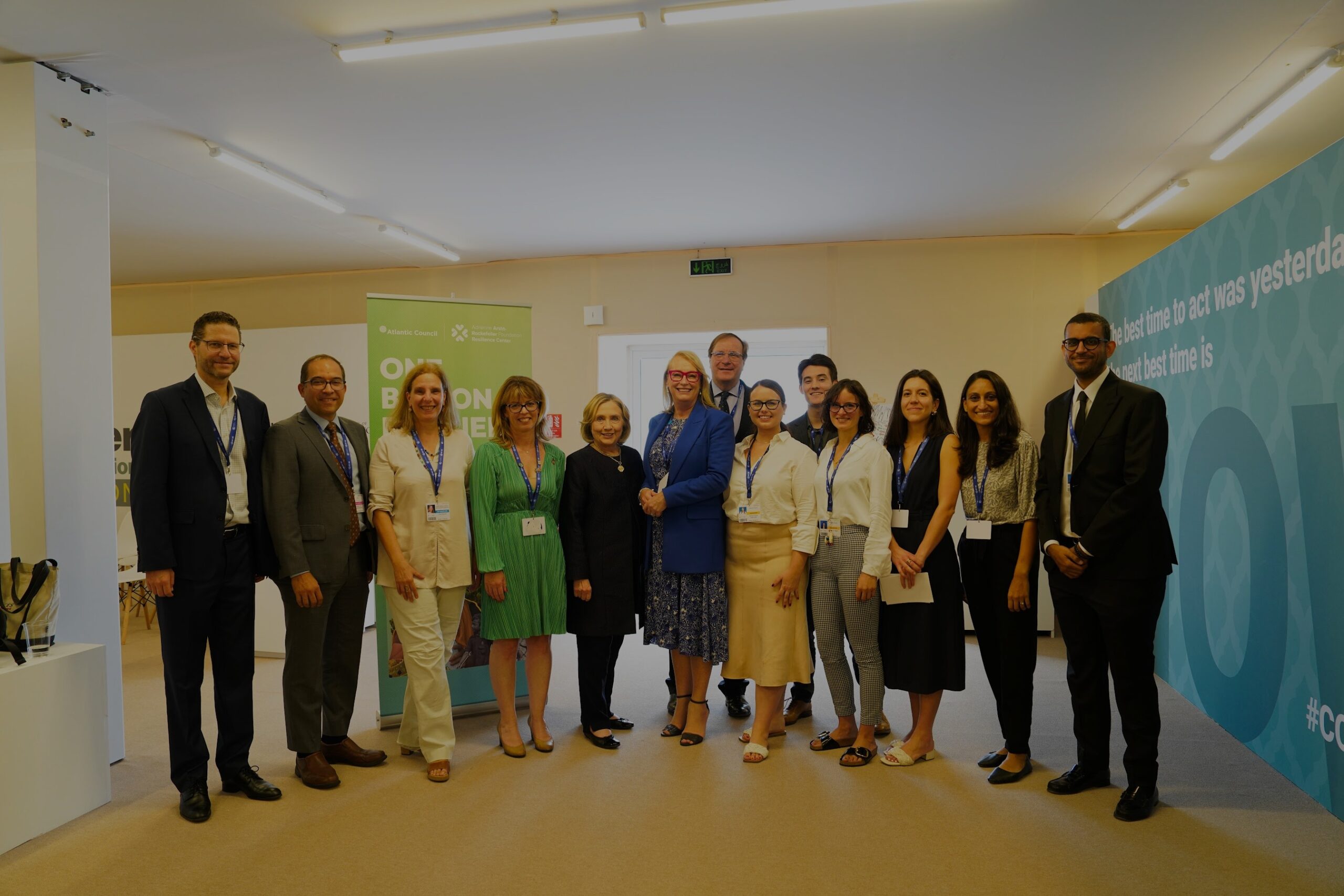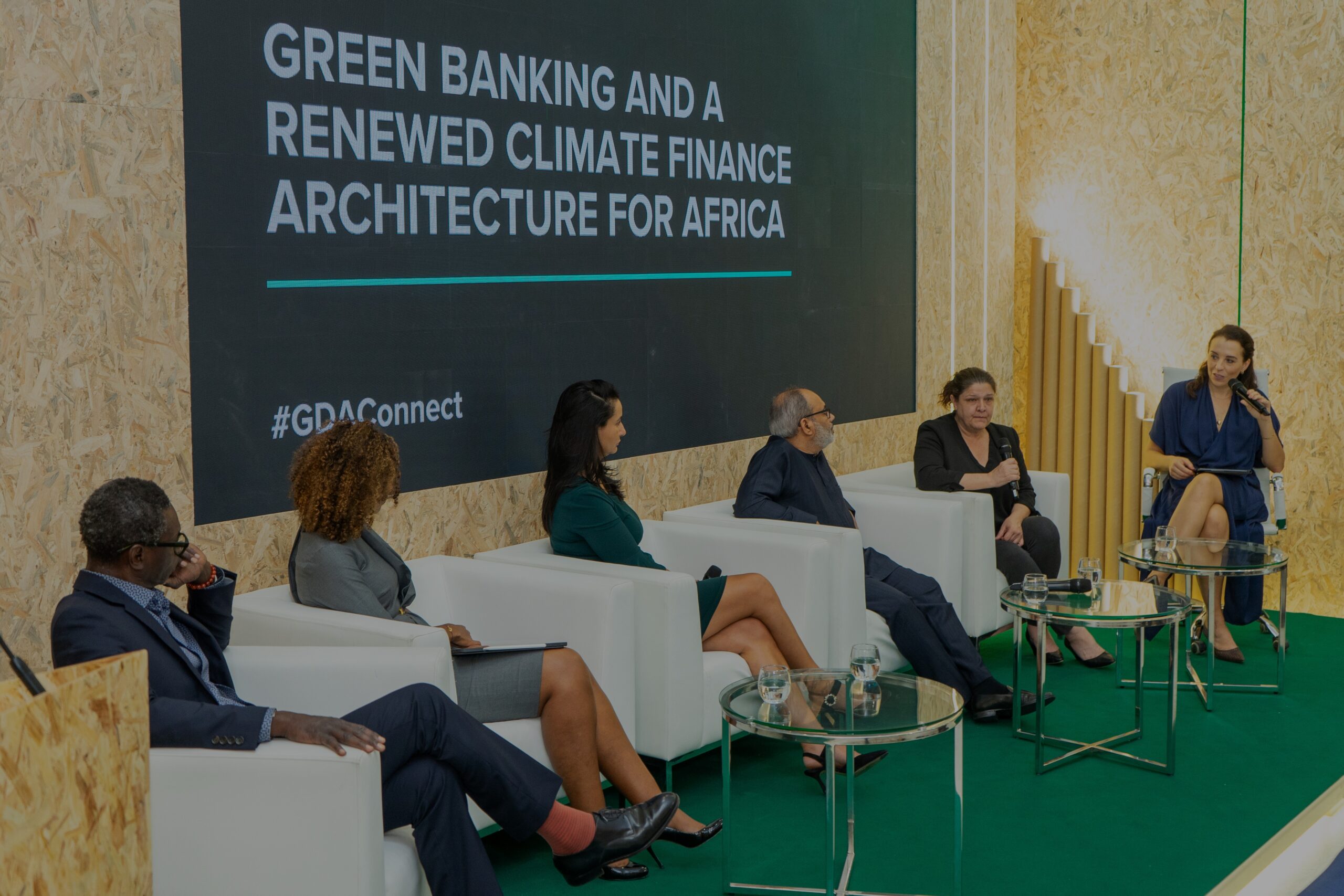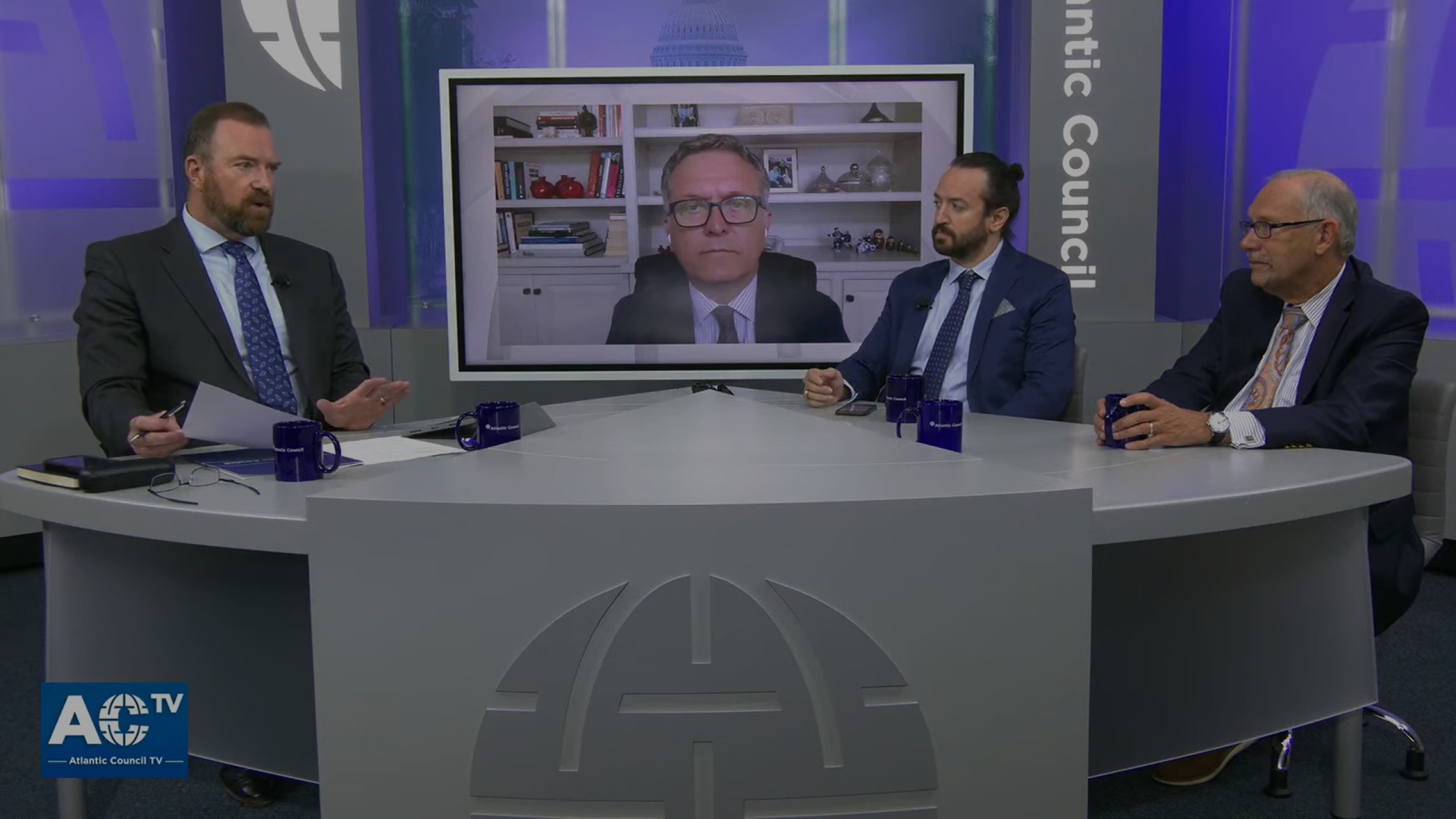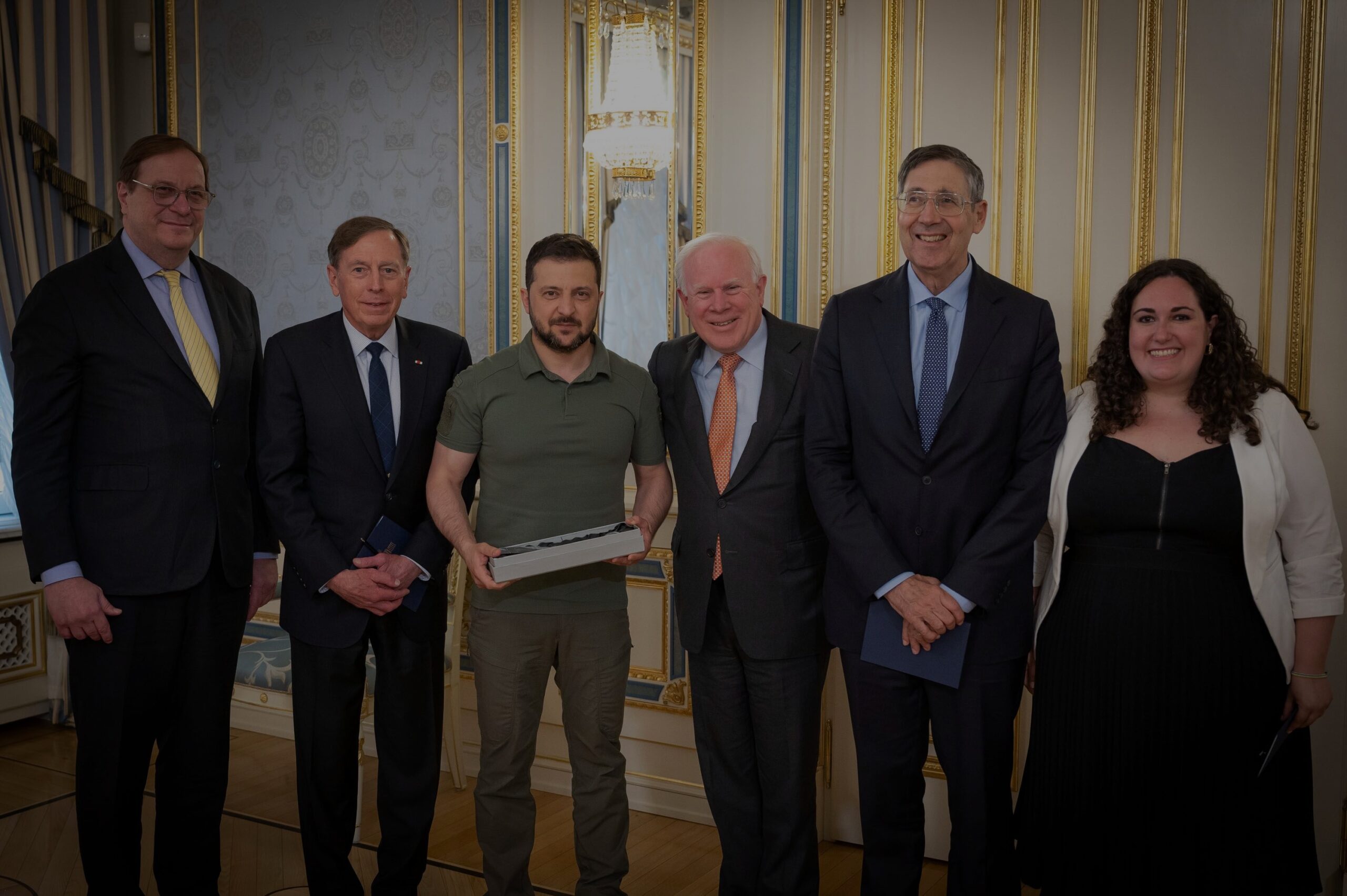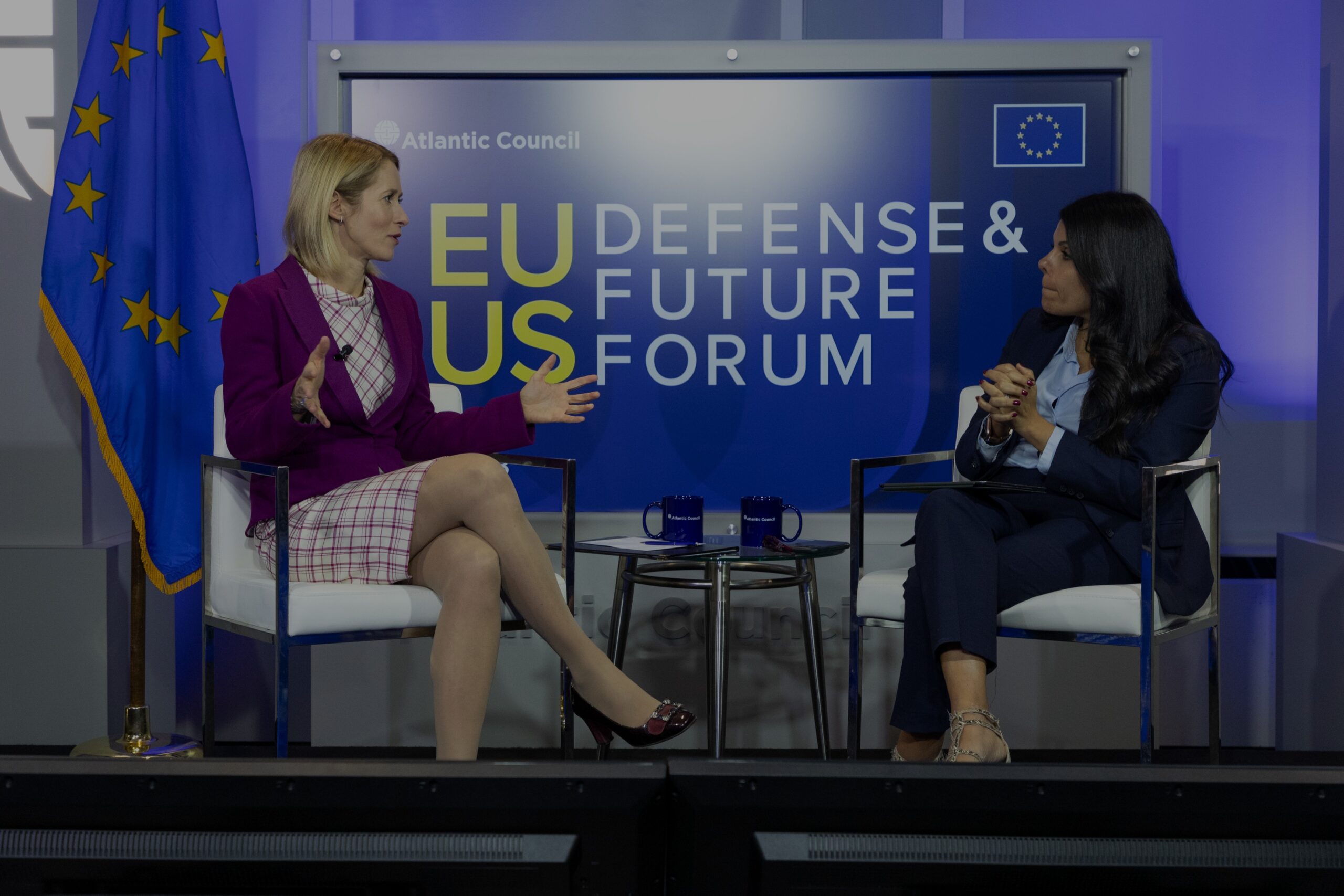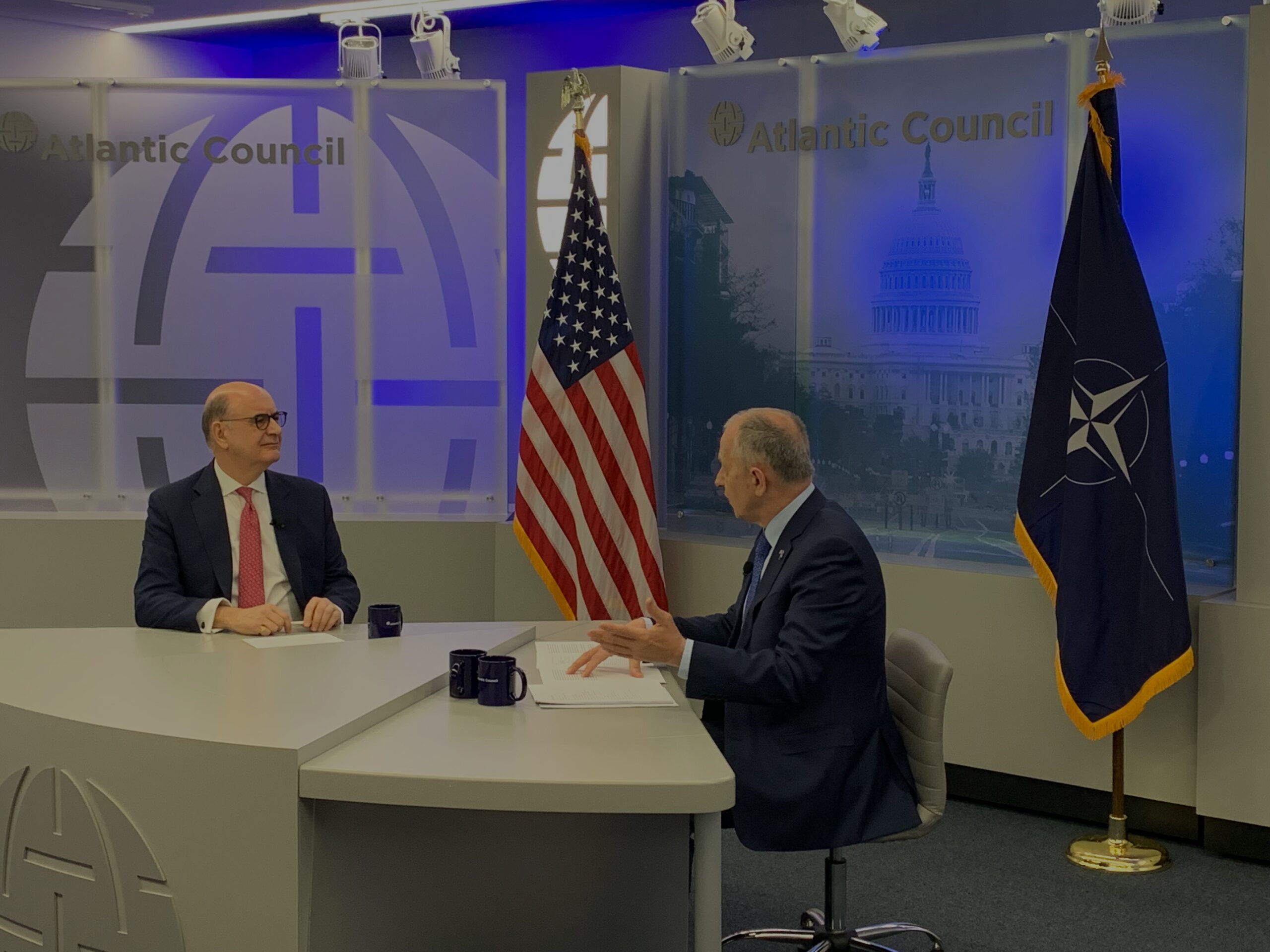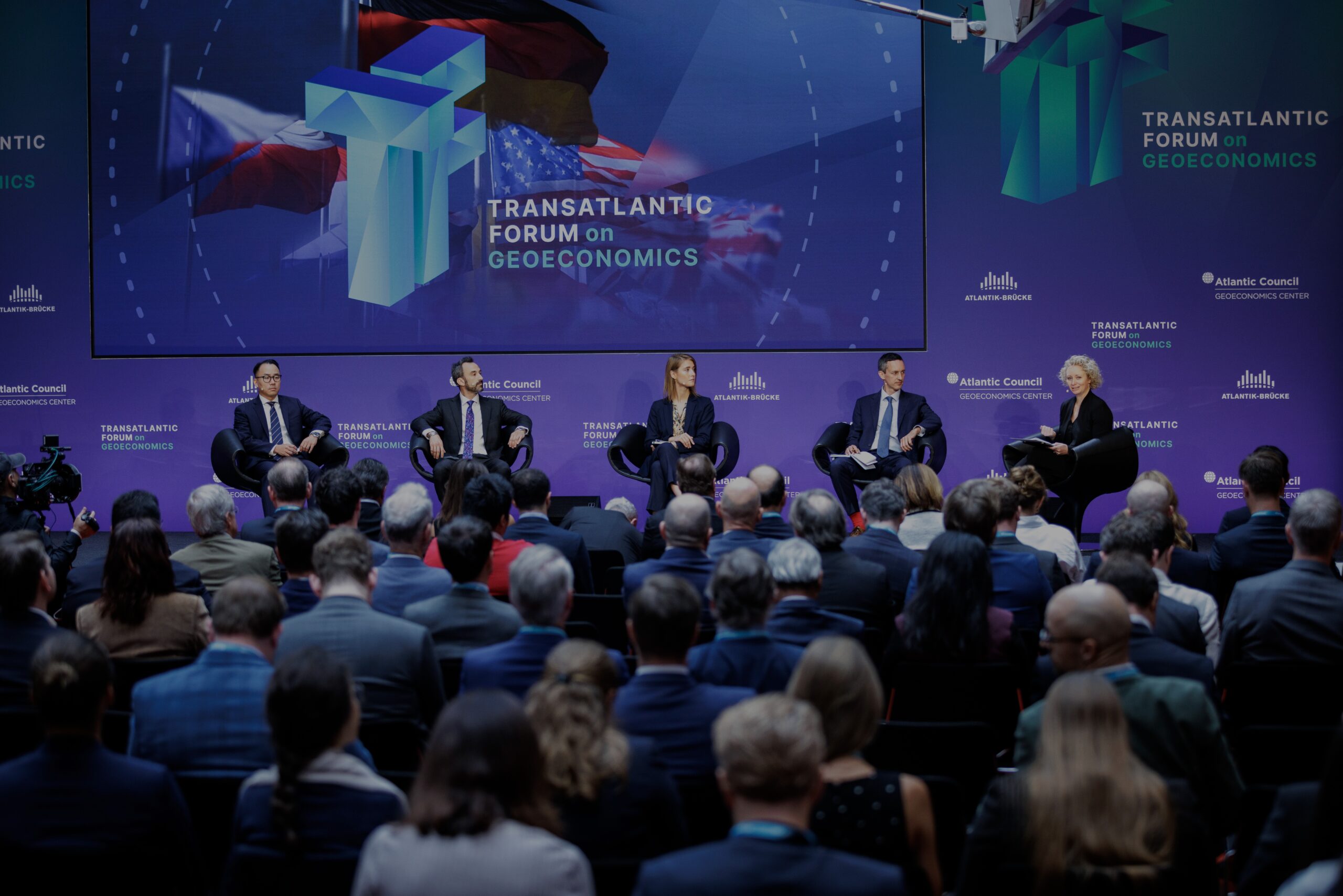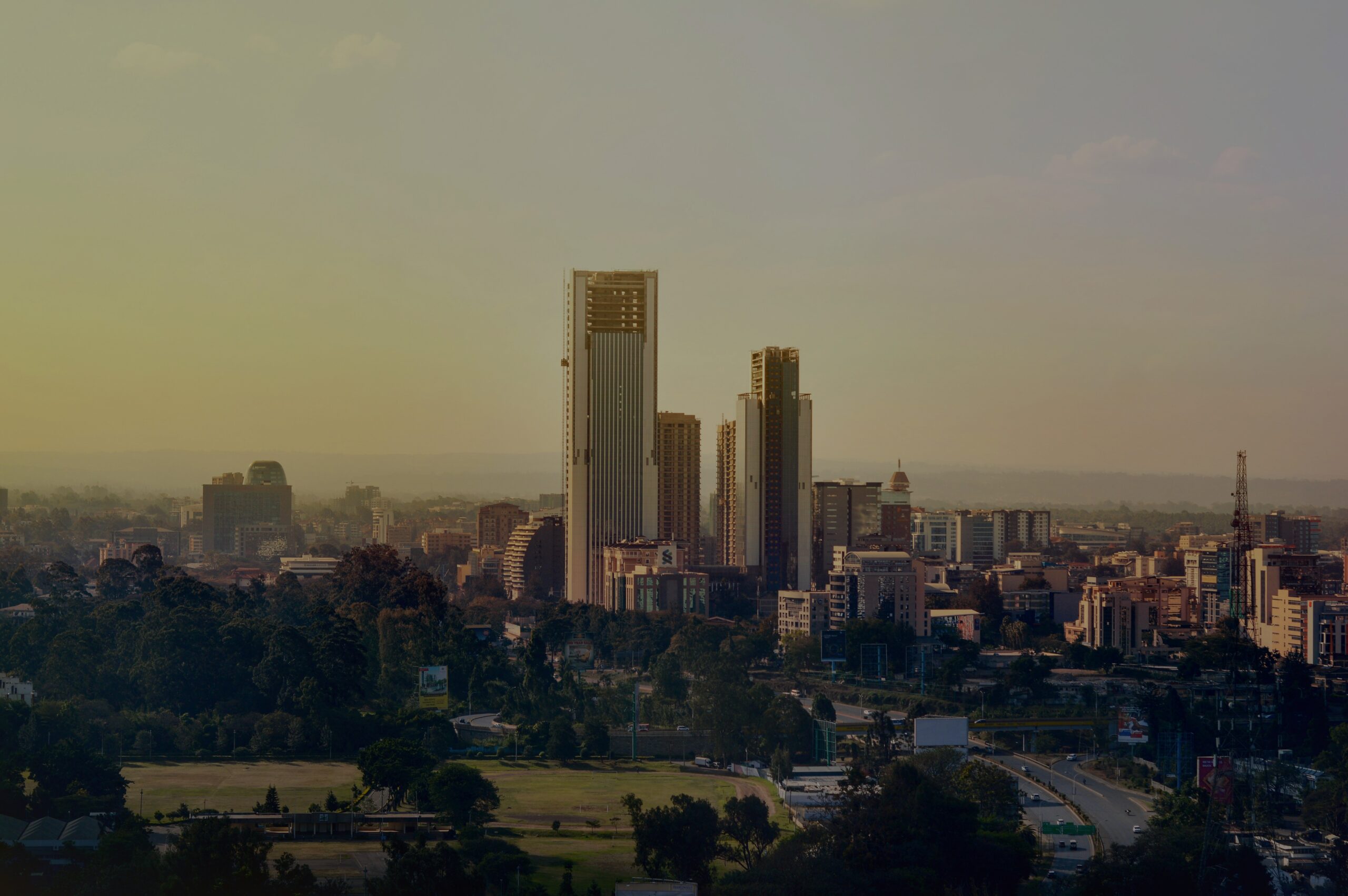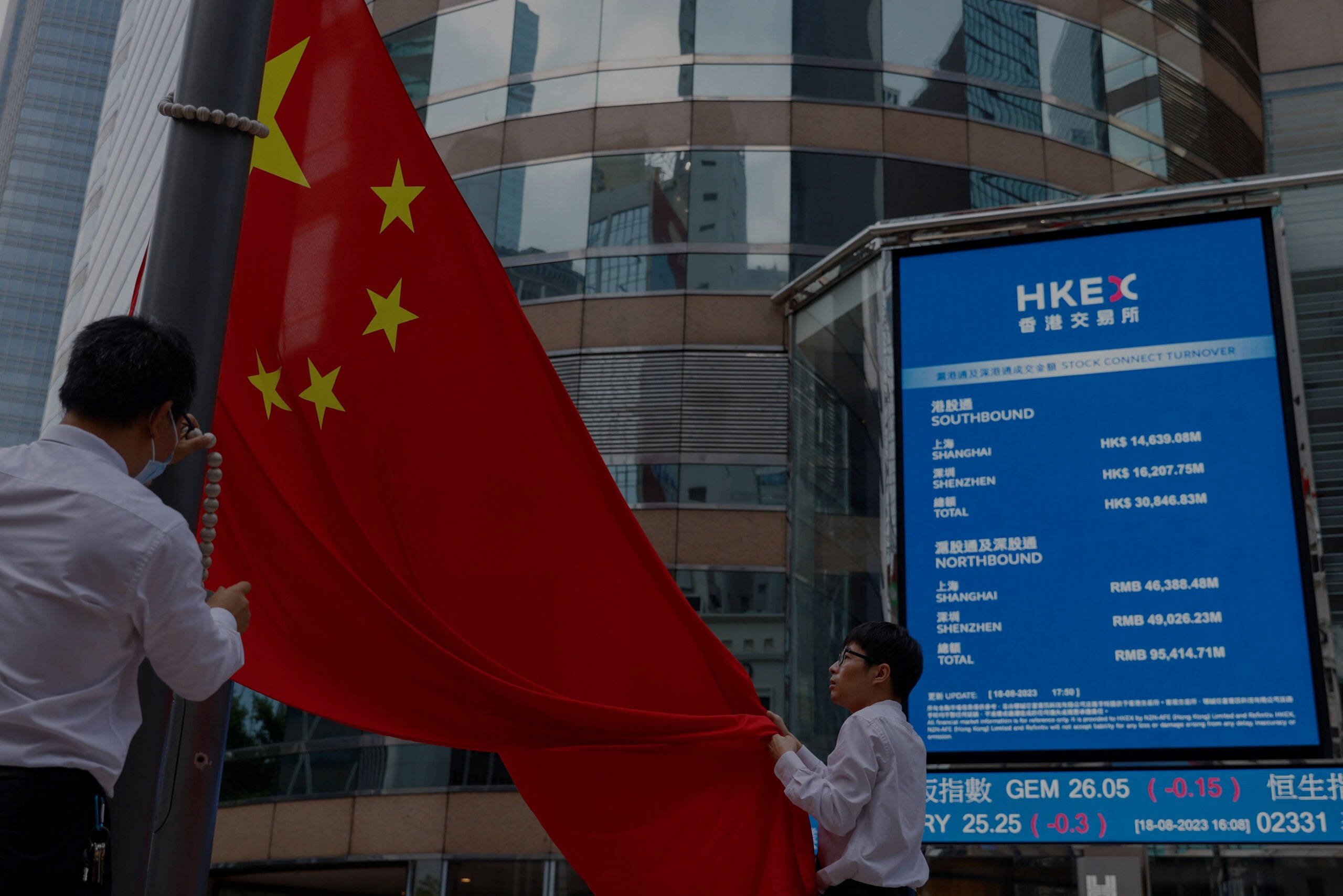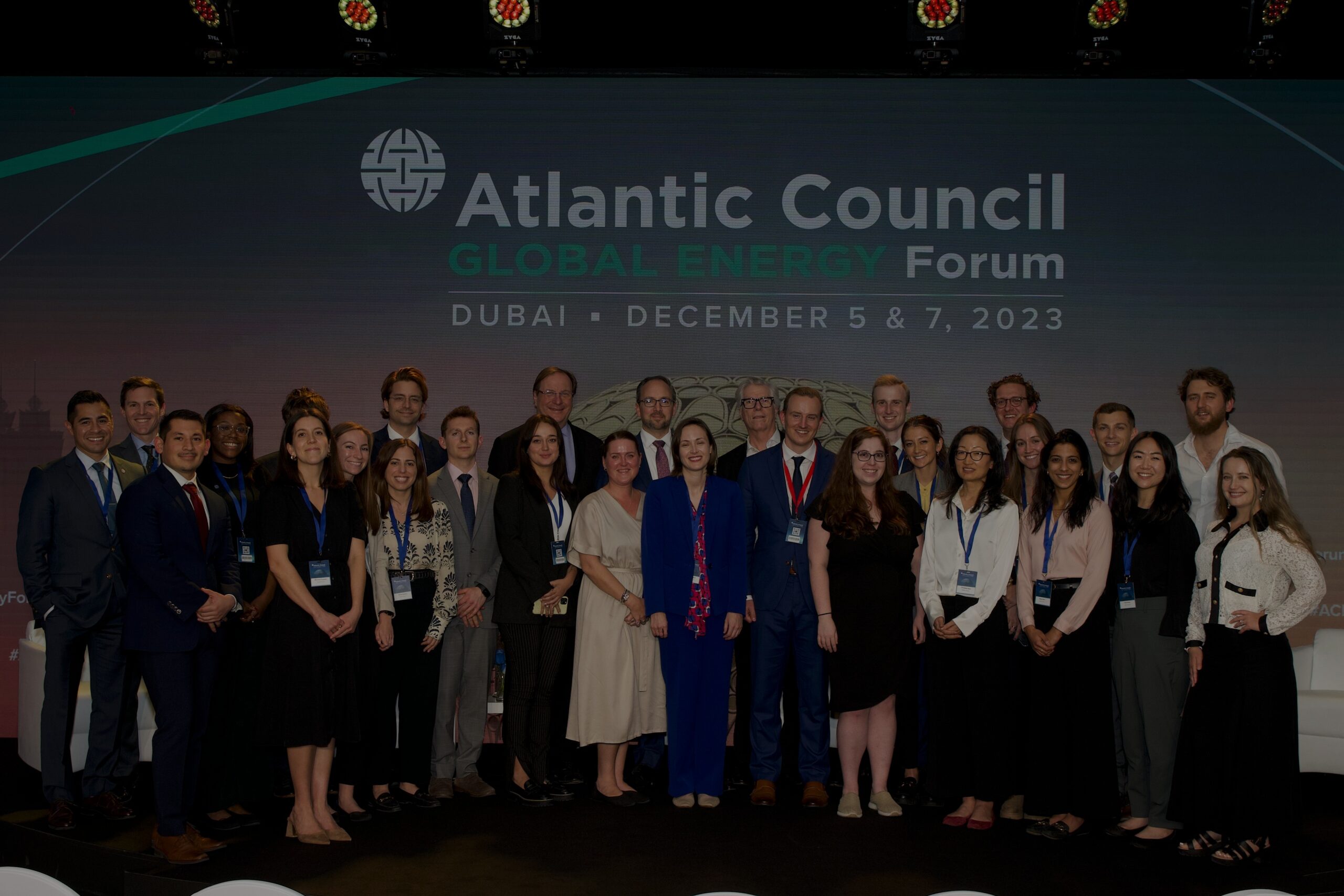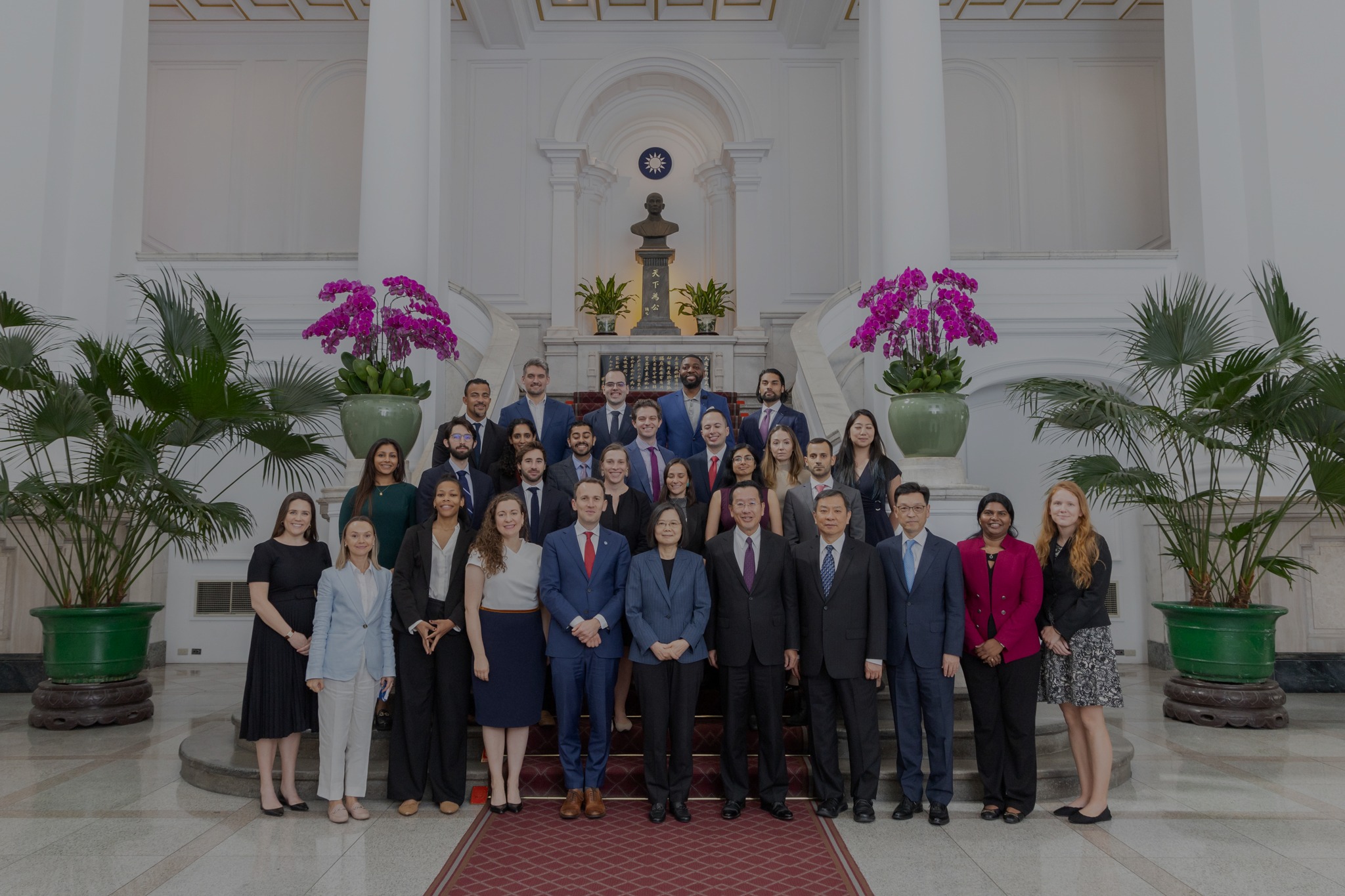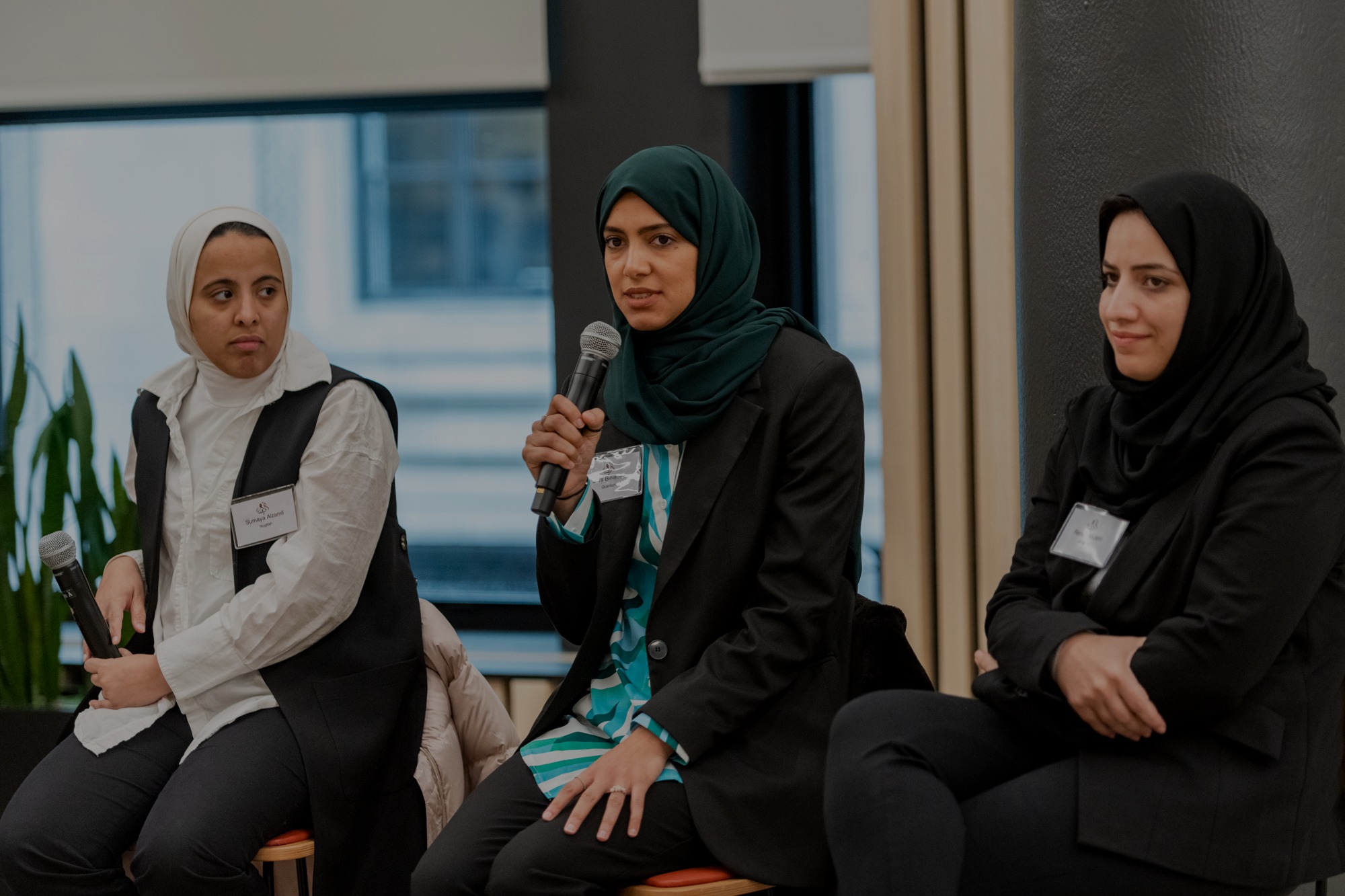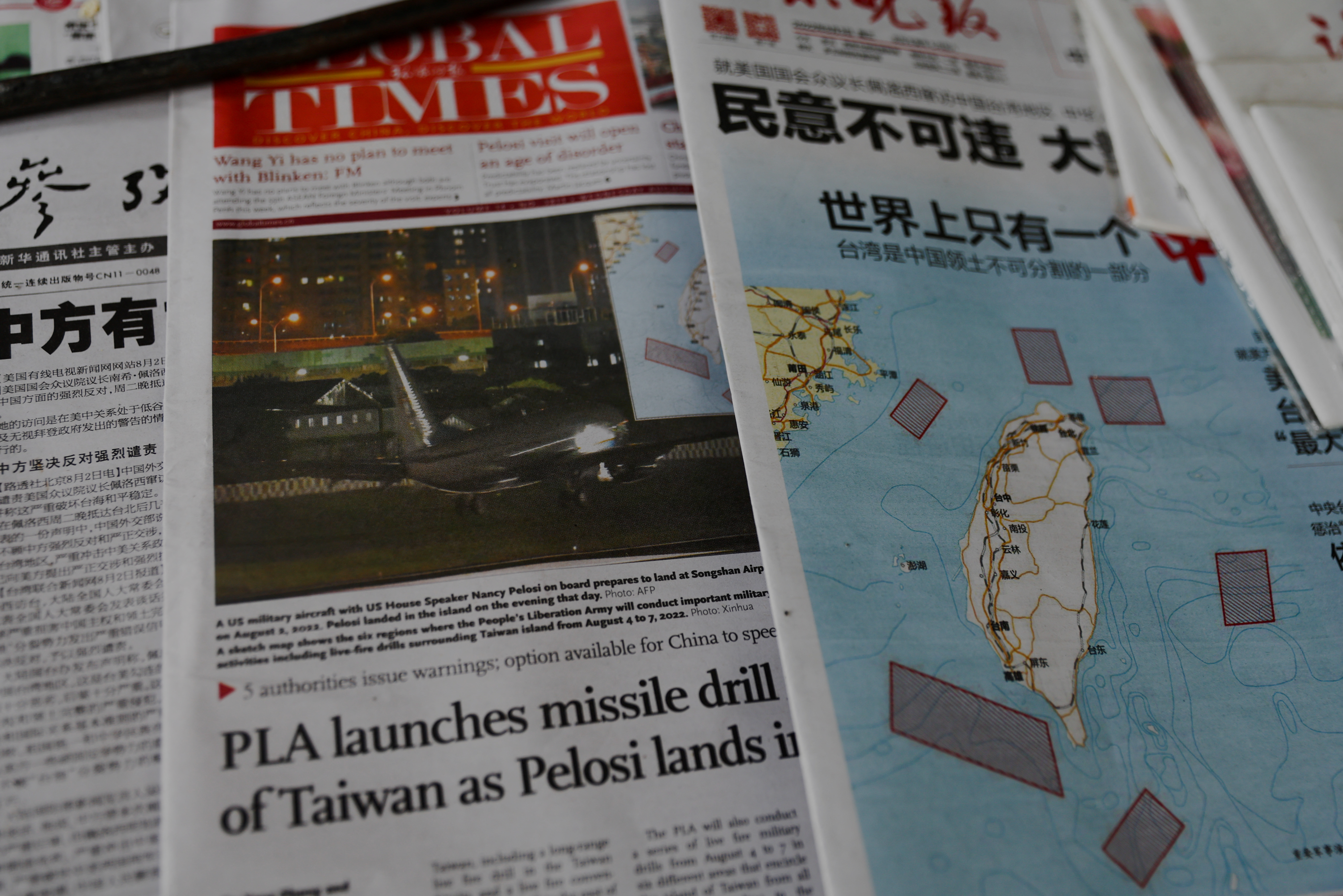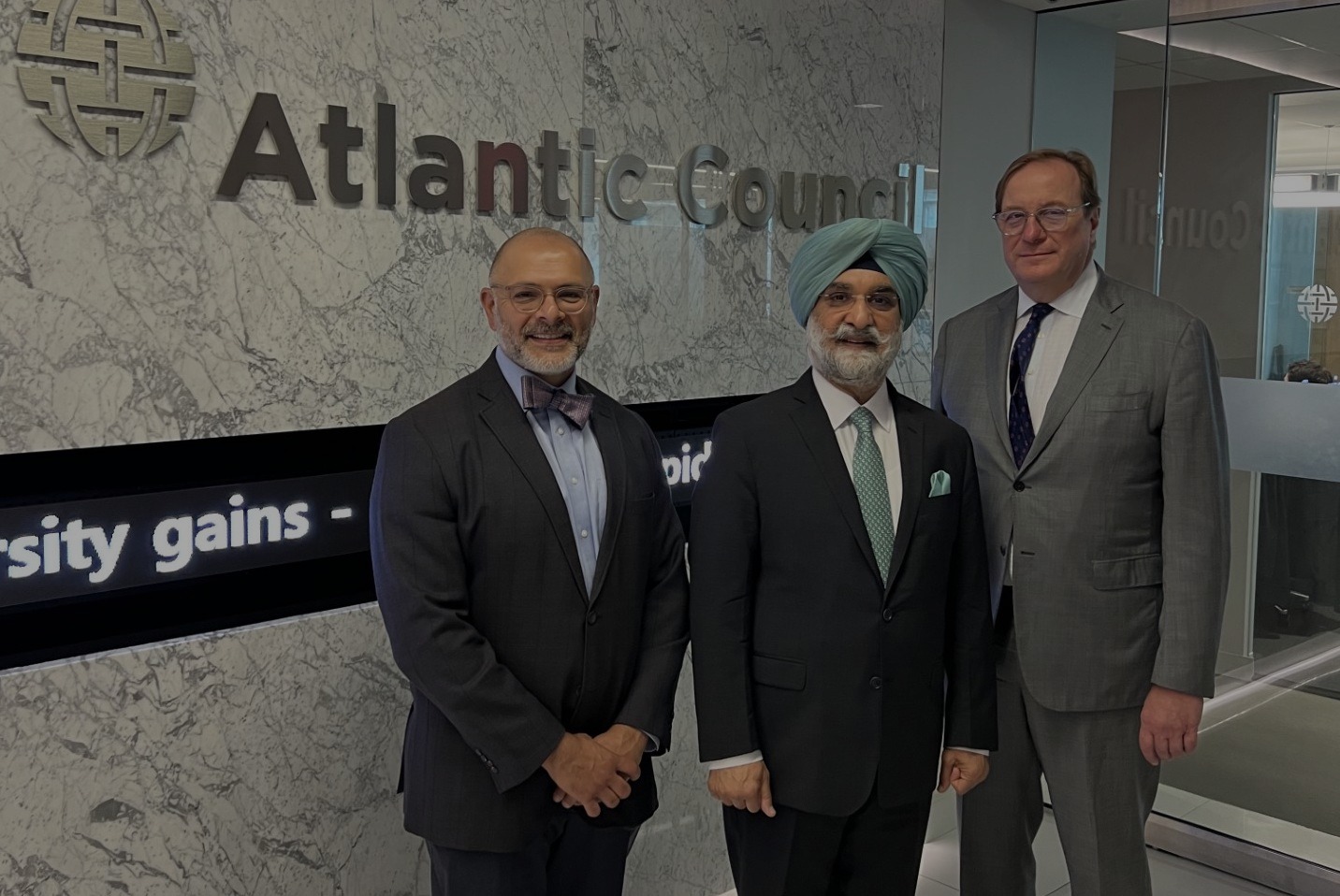2023 was the most successful year in the Atlantic Council’s history when measured by our growth, our impact, and our high-quality work across our sixteen programs and centers.
The Adrienne Arsht Latin America Center (AALAC) broadens understanding of regional transformations while demonstrating why Latin America and the Caribbean matter for the world. The center focuses on the pressing political, economic, and social issues that will define the region’s trajectory. AALAC proposes constructive, results-oriented solutions to inform public-sector, business, and multilateral actions to advance a vision for a more prosperous, inclusive, and sustainable future. AALAC—home to Washington’s premier Caribbean Initiative—builds consensus for action to advance innovative policy perspectives with a focus on select lines of programming to ensure relevance and impact.
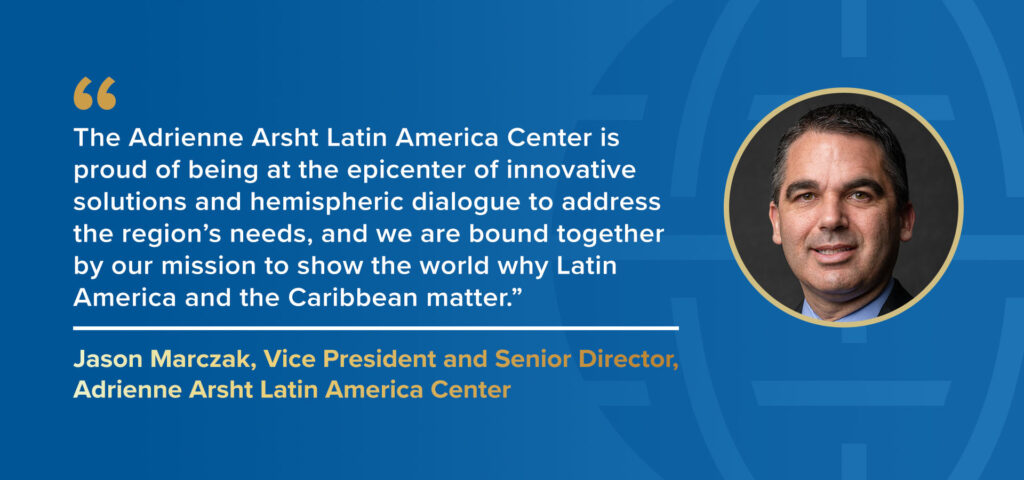
In its tenth year, AALAC deepened its impact, fostering global connections and driving policy changes. Through its convenings across eleven countries and seven US cities, alongside its publications and congressional footprint, AALAC elevated new ideas and consensus on how to work alongside partners to address top regional challenges with global implications. In the Caribbean, it led innovative energy and climate-change solutions, including hosting the PACC 2030 Climate Resilient Clean Energy Summit in The Bahamas, alongside US Vice President Kamala Harris’s inaugural visit to the Caribbean. Its groundbreaking research on the economic impact of reducing wait times at the US-Mexico border influenced bilateral conversations, with Mexico’s Secretary of Foreign Affairs Alicia Bárcena citing findings during the US-Mexico High-Level Economic Dialogue.
The center’s US-LAC Strategy Working Group charted the course for the next five years of a US-LAC partnership strategy, which was released in early 2024, in advance of the US elections. The relaunch of its US-Colombia Advisory Group, with US Sen. Bill Hagerty joining as honorary co-chair, facilitated continued nonpartisan, binational engagement. With the Atlantic Council’s Europe Center and Club de Madrid, it supported the momentum generated by Spain’s European Commission presidency to deepen transatlantic ties.
AALAC’s spotlighting of humanitarian-fund use in Venezuela reignited United Nations efforts to open previously frozen funding channels. During the inaugural Leaders’ Summit of the Americas Partnership for Economic Prosperity, the center’s official welcome dinner included the presidents of Chile, Costa Rica, the Dominican Republic, Ecuador, Peru, and Uruguay. To round out 2023, the center celebrated its milestone ten-year anniversary with a star-studded gala, honoring the Amazon Basin countries, Carlos Vives (who delivered a special musical performance), Cristina Junqueira, Mack McLarty, and Carlos Gutierrez.
The Adrienne Arsht-Rockefeller Foundation Resilience Center (Arsht-Rock) builds individual and community resilience in the face of climate impacts. It pledges to reach one billion people around the world with resilience solutions to climate change by 2030.
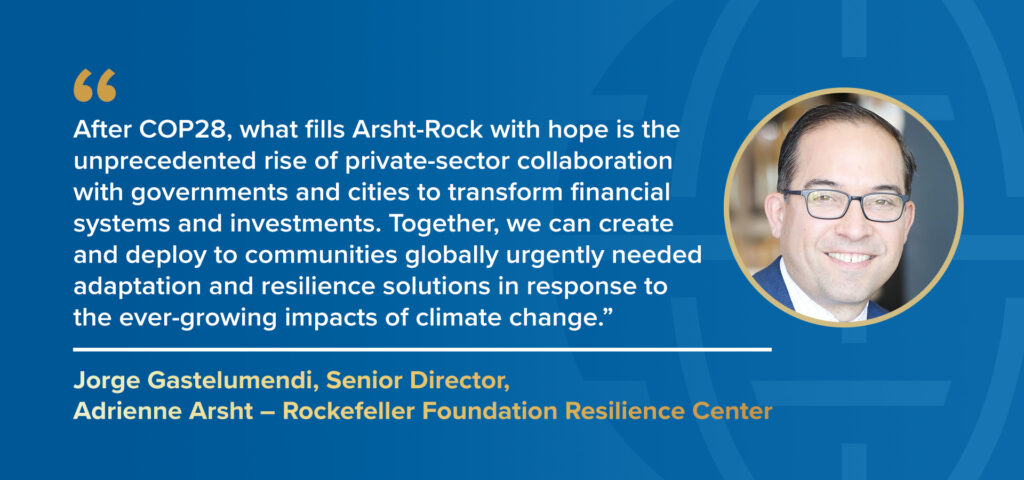
To better protect people from the dangerous impacts of extreme heat, Arsht-Rock expanded its work on climate adaptation and resilience in 2023. The center launched a new parametric insurance coverage for women in India, continued its pilot program to categorize and name heat waves, and hosted its first climate games accelerator program.
The Resilience Center also added to the global climate discourse by publishing a number of new publications and reports, including its economic analysis “The scorching divide: How extreme heat inflames gender inequalities in health and income.” The center further advanced this work at COP28, driving climate adaptation and resilience policy and financing for it. It welcomed its new global ambassadors Hillary Clinton, former US secretary of state, and Felipe Calderón, former president of Mexico, and other renowned climate leaders to six high-level events. Notably, the center also launched the Call for Collaboration, which aims to identify opportunities to accelerate and mobilize private finance for adaptation and resilience. To date, the call has twenty signatories, including the governments of Austria, Chile, Colombia, Guatemala, and Switzerland.
The mission of the Africa Center is to raise African voices and strengthen African nations’ influence in transatlantic dialogues. As the preferred destination for African cultural, political, and business leaders who want to create a more authentic African narrative, the center is also a powerful platform for producing better knowledge of Africa and promoting opportunities on the African continent. The center prepares policymakers and investors for the onset of the African century by supporting dynamic strategic partnerships with African states and multilateral institutions.
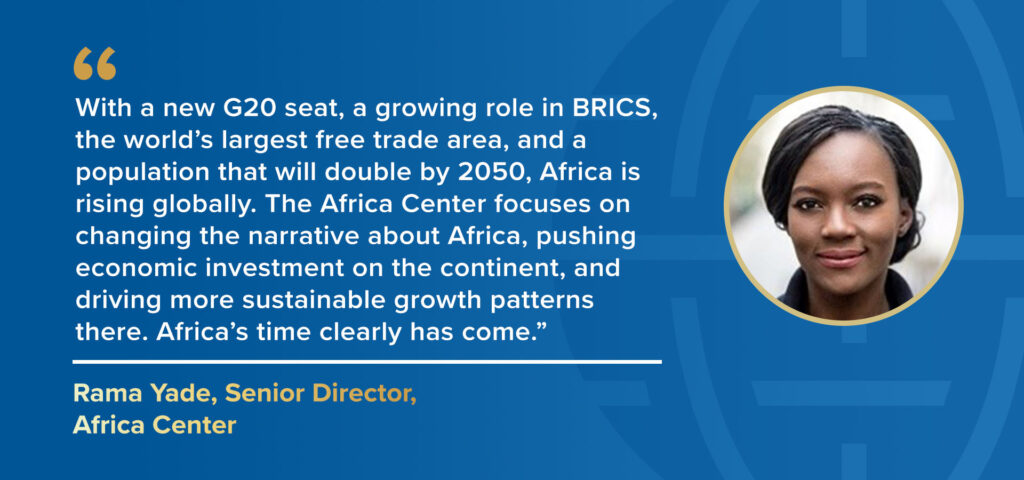
In 2023, the Africa Center navigated Africa’s hotspots through its series focused on democratic backsliding across the Sahel, continued programming on the war in Sudan, and conducted robust analyses on major geopolitical shifts across the continent.
The center has been at the forefront of discussions in Washington regarding the enlargement of the BRICS grouping to new African members, the Russia-Africa Summit and the consequences of Wagner Group leader Yevgeny Prigozhin’s death, the launch of a US Atlantic partnership, reforms of the Bretton Woods institutions, and the African Union’s new permanent membership in the Group of Twenty (G20). From Marrakesh with the World Bank-International Monetary Fund Annual Meetings, to Gaborone where the center kicked off discussions on the renewal of the African Growth and Opportunity Act, to Dubai for COP28, the Africa Center has showcased the central role of Africa as a rising actor in international relations. Through publications on digital infrastructure, green banking, and the agricultural sector, among other critical matters, the center also documented the issues faced by a continent that will double its population in the next twenty-five years.
The Atlantic Council in Turkey aims to support transatlantic relations by strengthening dialogue between Turkey and its allies, primarily the United States. In line with the Atlantic Council’s mission of promoting constructive leadership and engagement in international affairs based on the Atlantic community’s central role in meeting global challenges, the center’s goal is to bolster transatlantic engagement with Turkey and its surrounding region through forward-looking research and high-impact, high-level convening. The program spotlights critical issue areas including energy, economics, business relations, migration, defense, and security.
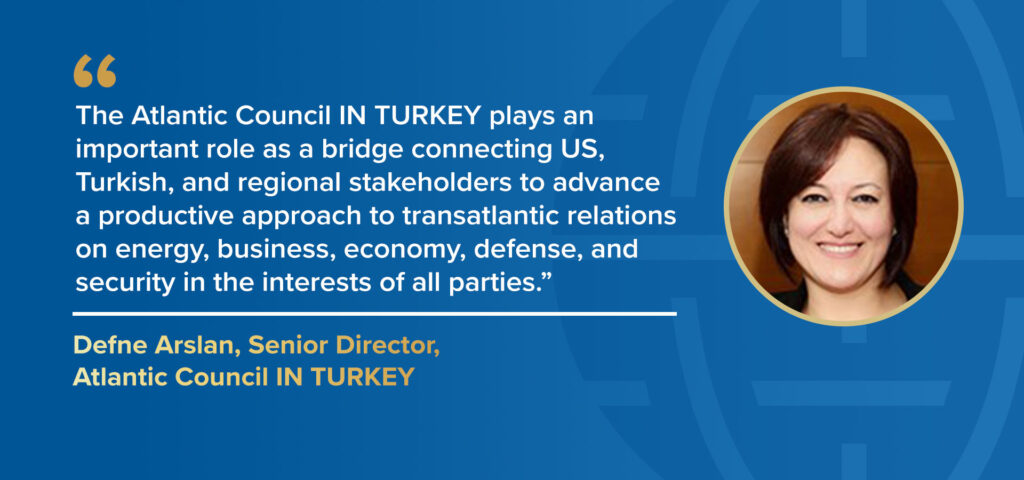
The center’s featured project of 2023, aimed at strengthening a cornerstone of the transatlantic relationship, was the Defense Journal, a periodic publication covering the latest developments in the United States-Turkey defense relationship and providing analysis on the full spectrum of defense and security issues affecting the United States, Turkey, and the region. In recent years, the defense ties that have helped underpin the United States-Turkey relationship since the latter’s accession to NATO in 1952 have come under pressure. Through this publication, the center aims to enhance dialogue in the region and re-energize the relationship, while creating a platform for defense stakeholders to discuss regional developments. The Defense Journal was launched at a hybrid event featuring former and current policymakers and leading experts in Washington on June 22, 2023.
The Digital Forensic Research Lab (DFRLab) is a global leader at the intersection of government, industry, civil society, and media in an era of rapid technological change. Comprised of the Cyber Statecraft Initiative, the Democracy + Tech Initiative, the DFRLab research team, and capacity-building efforts, and spread across seventeen countries, the DFRLab believes in transparency, accountability, and security online and around the world. The core of its approach is technical research that provides real evidence and examples at a granular level to inform policy, combined with convening stakeholders to use that research as the basis for action.
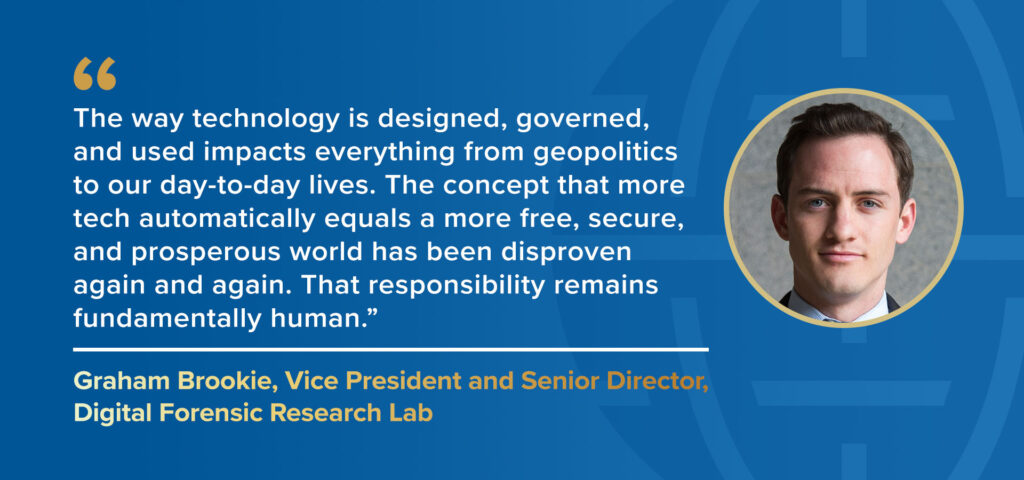
In 2023, the DFRLab’s global research team worked at the digital forefront of an era of ever-increasing geopolitical competition and technological change. Researchers continued their years-long effort to expose Russia’s use of influence operations to justify its war of aggression against Ukraine, including unearthing the largest state-backed operation ever discovered on TikTok. They published in-depth technical analysis of how China implements its increasingly assertive “discourse power” strategy around the world. They continued to monitor the use of social media in conflict, including the use of online platforms in the Israel-Hamas conflict. And they dissected how competing powers in Sudan weaponized internet regulations to suppress pro-democracy movements.
The year also began with a five-month sprint to chart the future of the internet. The Democracy + Tech Initiative convened a fifty-day Task Force for a Future Trustworthy Web that included forty high-level experts, engineers, executives, investors, and policymakers from varying technical backgrounds. During that time, the internet changed substantially, as the European Union’s Digital Services Act came into force and Open AI released ChatGPT. The task force’s findings remain relevant even with rapid technological change and will shape investment and standards for the emerging era. Likewise, the Cyber Statecraft Initiative matched technical analysis with field-leading policy work to help shape the US National Cybersecurity Strategy and host the launch of the National Cyber Workforce and Education Strategy.
Any strategy is only as good as the people implementing it. This year, the team formalized a number of first-in-class efforts to build communities of action into an expanded capacity-building initiative. This includes the DFRLab’s Digital Sherlocks program that reached 1,163 people in 146 countries, the Cyber Statecraft Initiative’s Cyber 9/12 competitions that expanded to Latin America and Eurasia for the first time and included twenty-two teams from thirteen countries, and a new digital policy community-building effort launching in 2024. As always, the DFRLab matches analysis with action.
The Eurasia Center’s mission is to promote policies that encourage stability, democratic values, and prosperity in Eurasia. A democratic, prosperous, and stable Eurasia is a core interest for the United States and plays into the Atlantic Council’s focus on great power competition.
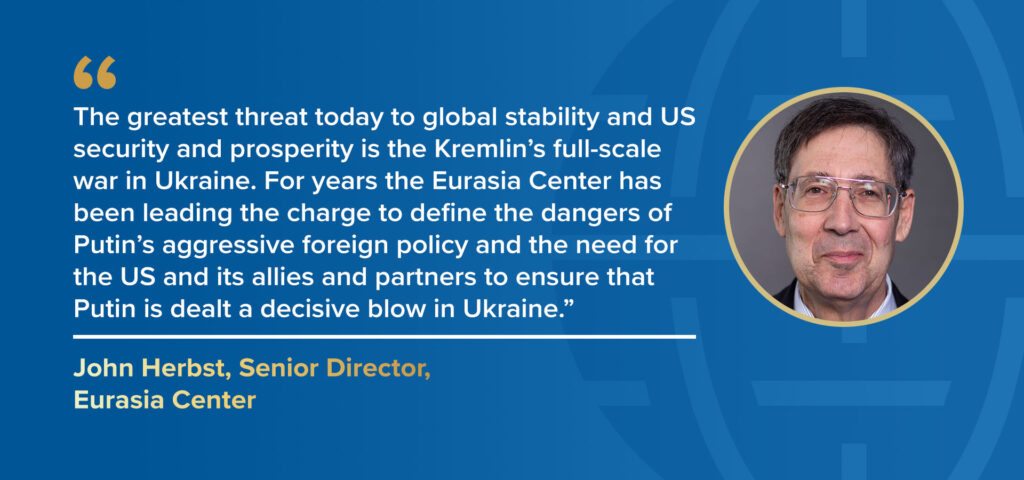
In 2023, the Eurasia Center continued to lead the conversation in Washington on a stronger Western response to Russia’s war against Ukraine. Led by former US Ambassador to Ukraine John Herbst, the Eurasia Center team consistently outlined why major Western support for Ukraine is in US and transatlantic interests and provided actionable recommendations to policymakers on Capitol Hill, in the White House, around Washington, and across Europe. The Eurasia team spearheaded a “Memo to the President” on how the administration should handle the issue of Ukraine’s relationship to NATO at the Washington NATO Summit, and presented it to senior officials in Washington and six European capitals. Alongside Atlantic Council CEO Fred Kempe, Board Chairman John F. W. Rogers, and Board member David Petraeus, the Eurasia Center presented the Atlantic Council’s 2023 Global Citizen Award to President of Ukraine Volodymyr Zelenskyy in Kyiv, and then welcomed him in New York City at the Council’s Global Citizen Awards gala. Throughout 2023, the Eurasia Center remained a top source for analysis on Ukraine and Russia through short-form articles on its UkraineAlert section and timely events that helped shape both public and policy discussions on the war in Ukraine. The center’s flagship Eurasia Congressional Fellowship for congressional staffers once again featured a trip to Lithuania and Poland to learn more about the regional impact of the war.
Elsewhere in the region, the Eurasia Center hosted high-level officials from Armenia, Azerbaijan, Belarus (the democratic forces), Georgia, Kazakhstan, Moldova, and Uzbekistan to discuss recent developments in their respective countries, encourage freedom and prosperity at home, and chart pathways toward stronger relations with the United States.
The Europe Center conducts research and uses real-time analysis to inform the actions and strategies of key transatlantic decisionmakers in the face of great power competition and a geopolitical rewiring of Europe. The center convenes US and European leaders to put the transatlantic relationship to work on shared global challenges and make the case for the US-EU partnership as a key asset for the United States and Europe alike.
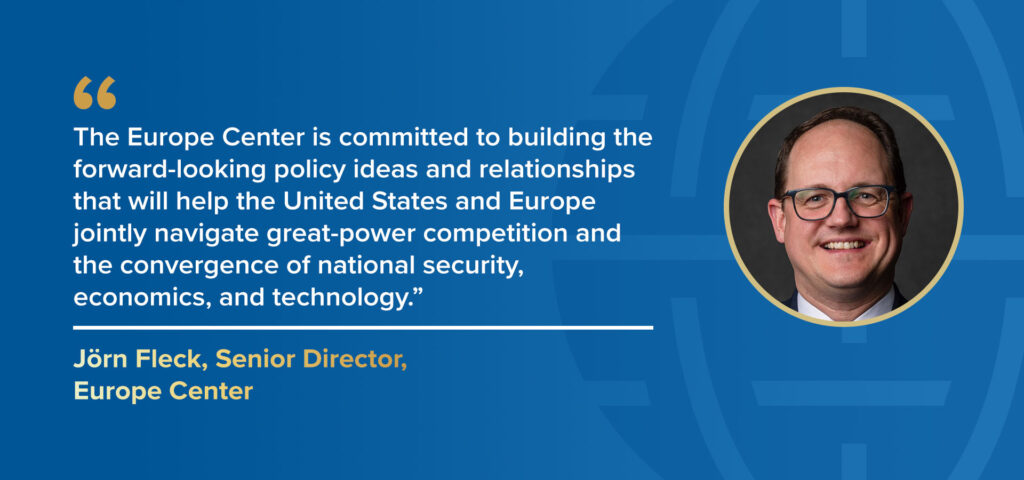
In 2023, Europe and the United States continued to face existential challenges as both sides of the Atlantic reexamined their strategic thinking and dependencies in a changing geopolitical context. The Europe Center was present every step of the way, using its unique combination of convening power and expert analysis on all aspects of the transatlantic relationship.
The center hosted more than 170 public and private events in fifteen countries, recorded more than fifty “Debrief” podcast episodes, authored more than ninety Atlantic Council reports and commentaries, and was cited in more than 150 media outlets. The Europe Center’s flagship events—the EU-US Defense & Future Forum, Central Europe Week, and Warsaw Week—convened hundreds of officials and experts to emphasize the role of the European Union (EU) in the transatlantic partnership, explore the EU’s growing geopolitical footprint, and raise the profiles and prospects of Central European voices.
The Europe Center’s thematic and geographic workstreams produced industry-leading reports and commentary. The Transatlantic Digital Marketplace Initiative’s TTC Track-2 Stakeholder Dialogues published policy papers on the future of the transatlantic trade and technology relationship. The Next Europe workstream tracked the progress of US-EU convergence on China and proposed a productive US-EU industrial policy agenda. The Transform Europe Initiative published a series of policy papers that reimagined the role decarbonization plays in Europe’s energy independence. The Balkans Forward Initiative convened trust-building track 2 formats and published forward-leaning proposals for the region. The Northern Europe Office tracked and advocated for a greater role for Sweden and the other Nordic countries in Europe’s security and defense.
The Freedom and Prosperity Center aims to increase the well-being of people everywhere and especially the poor and marginalized in developing countries through unbiased, data-based research on the relationship between prosperity and economic, political, and legal freedoms, in support of sound policy choices.
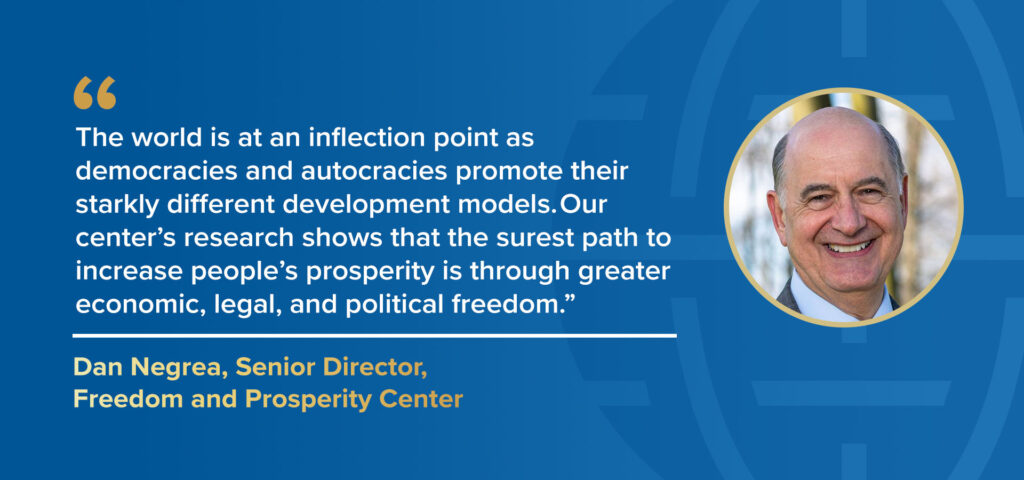
During 2023, the center published its second annual Freedom and Prosperity Indexes report and launched its award-winning indexes website. It also published its inaugural collection of essays, The Freedom and Prosperity Equation, which included contributions from thirty scholars and political leaders from twelve countries. The center also held its inaugural research conference, which attracted more than three hundred experts and participants from more than thirty-five countries. The center also organized convenings and published articles to advance its ideas.
The GeoEconomics Center develops data-driven programs, publications, and thought leadership at the nexus of economics, finance, and foreign policy. The center aims to bridge the divide between these oft-siloed sectors, with the goal of helping shape a more resilient global economy. Its work is built on the idea that the United States must lead with allies or risk becoming a bystander in a reshaped international financial system. The center is organized around three pillars—the Future of Capitalism, the Future of Money, and the Economic Statecraft Initiative.
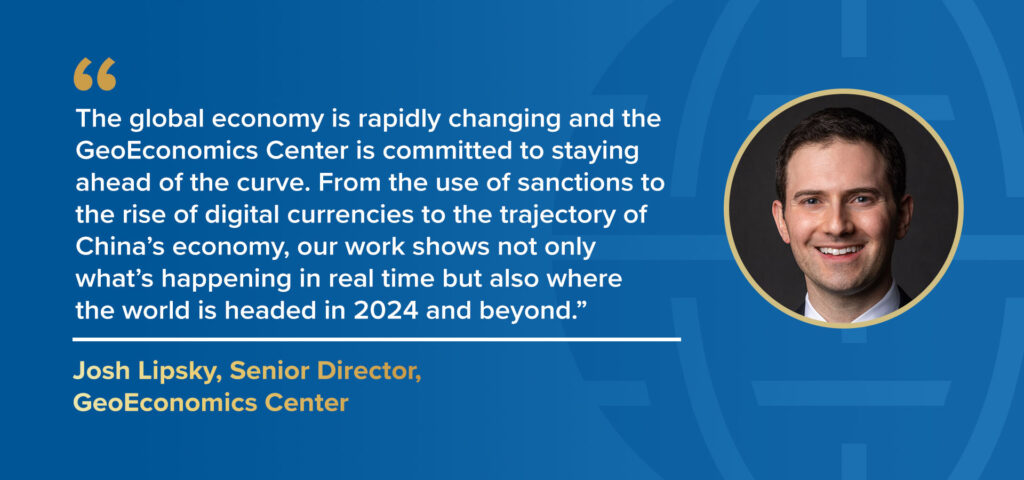
In 2023, the GeoEconomics Center led the field at the nexus of economics, finance, and foreign policy.
The GeoEconomics Center tackled the most complex geopolitical and economic questions, and produced research that has informed leading decision makers. The team made a mark with interactive data visualizations and innovative economic modeling. The center continues to help Washington and its allies understand the rapid evolution of challenges to the US-led economic system. A major highlight of the year was the center’s flagship research on economic risks stemming from conflict in the Taiwan Strait and the potential for a coordinated economic-statecraft response. This research was featured in international news and became part of exercises conducted by both banks and governments. With a total of fourteen comprehensive reports and more than one hundred articles on its Econographics section, the center constantly irrigated the conversation with new facts, numbers, and ideas, including rebuilding the Society of Worldwide Interbank Financial Telecommunication (SWIFT) system and understanding China-Russia currency links.
In Washington and far beyond, the center used its growing convening power to host essential discussions. At its flagship Transatlantic Forum in Berlin, the center launched the first blueprint for transatlantic coordination of coercive and positive economic statecraft. The center was the only think tank with a studio inside the campus of the International Monetary Fund-World Bank meetings in Marrakesh, Morocco, hosting dozens of finance ministers and central-bank governors as part of its innovative Bretton Woods 2.0 project. Finally, much closer to Washington, it organized one of the first conferences devoted to central bank digital currency, bringing together more than two hundred participants from government and private digital-asset companies—two groups that often talk past each other.
The mission of the GeoTech Center is to shape the future of technology and data to advance the planet, people, prosperity, and peace. The center works to ensure emerging technologies enter use across the globe for public benefit, while identifying and mitigating potential geopolitical risks. Recent programs have focused on globally promoting human-centered governance of artificial intelligence; bridging data divides; increasing the humanitarian-focused expansion of next-generation space-based communications; and enhancing the capacity of governments to use, regulate, and promote a range of emerging technologies.
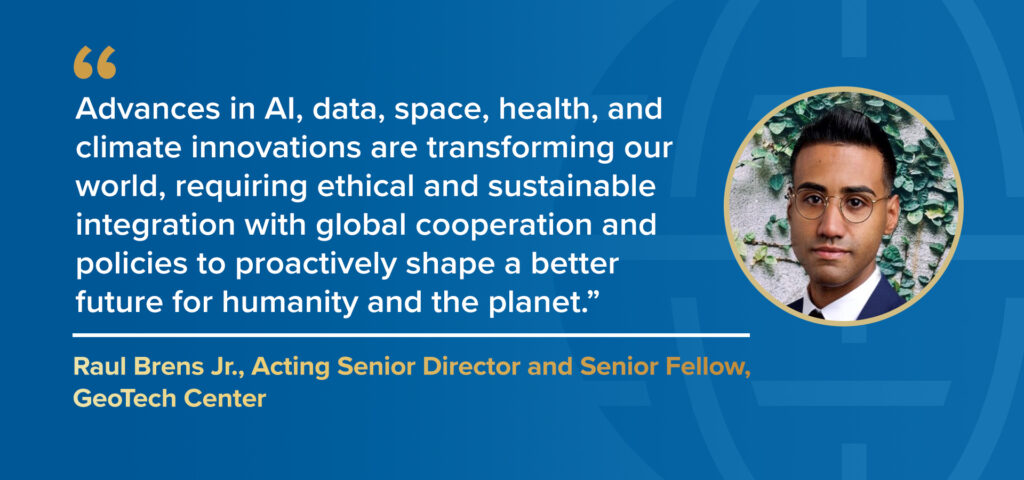
In 2023, the GeoTech Center deepened its programmatic work on commercial space, artificial intelligence (AI), and government capacity building.
Alongside the seventy-fourth International Astronautical Congress in Baku, Azerbaijan, in October, the GeoTech Center hosted a networking reception highlighting the importance of the growing commercial space sector worldwide and the need for increased public-private cooperation to ensure space sustainability and operational viability. The evening featured remarks from US Office of Space Commerce Director Richard Dalbello and International Telecommunications Union (ITU) Senior Engineer for Space Systems Jorge Ciccorossi, and brought together an esteemed international group of more than eighty experts from twenty-one countries, representing the world’s most prominent private space companies and organizations.
The center also successfully completed its AI Connect Program with a final stop in Nairobi, Kenya to host an in-person, pan-Africa workshop on responsible AI, convening forty AI professionals from twelve African countries to explore regional policy. AI Connect encourages the responsible stewardship of AI technologies in line with the Organisation for Economic Co-operation and Development (OECD) AI Principles and empowers low- and middle-income countries to more effectively participate in the global, multistakeholder conversation on AI policy.
The Global China Hub’s mission is to research and devise allied solutions to the greatest global challenges posed by China’s rise, leveraging and amplifying the Atlantic Council’s work on China across its sixteen programs and centers. In doing so, the Hub capitalizes on the Council’s extensive global network and unique capacity to ascertain “ground truth” on China’s impact and galvanize creative policy solutions.
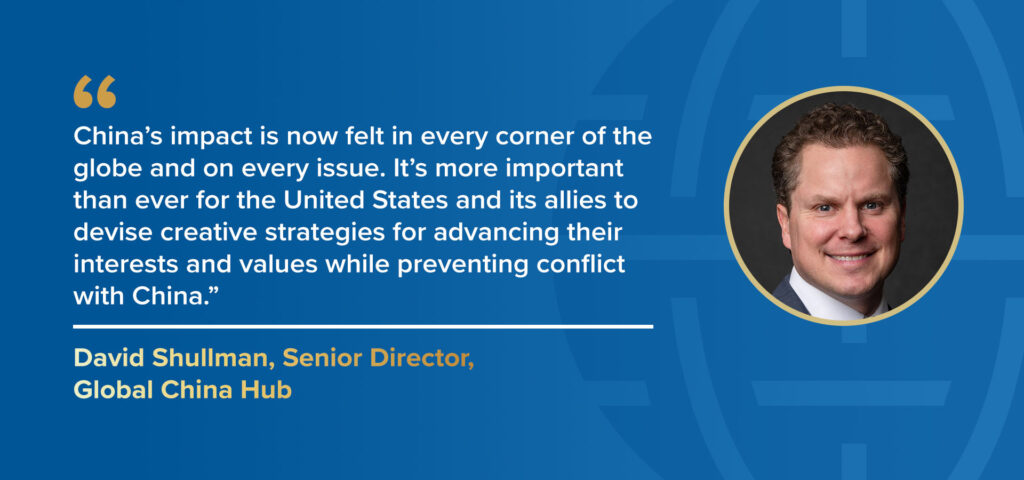
The Global China Hub partnered with centers and programs across the Atlantic Council to lead the conversation on China on a range of issues, from Beijing’s drive to dominate emerging technologies in the context of growing US-China strategic competition to its efforts to revise the global order and lead the Global South. The Hub also led robust programming on China’s economic statecraft and coercion, and on Taiwan’s domestic politics and the rising risk of conflict in the Taiwan Strait. The Hub’s impact was amplified through high-level participation of senior US and allied officials in its convenings, including co-hosting the public rollout of the Pentagon’s 2023 China Military Power Report. The Hub also kicked off exciting new bodies of work on China’s growing influence in Latin America and shifting nuclear doctrine in a potential crisis.
Across these efforts and more, the Hub remained focused on the centrality of US allies and partners to navigating the challenges posed by China’s global ambitions.
The Global Energy Center develops and promotes pragmatic and nonpartisan policy solutions designed to advance global energy security, enhance economic opportunity, and accelerate pathways to net-zero emissions.
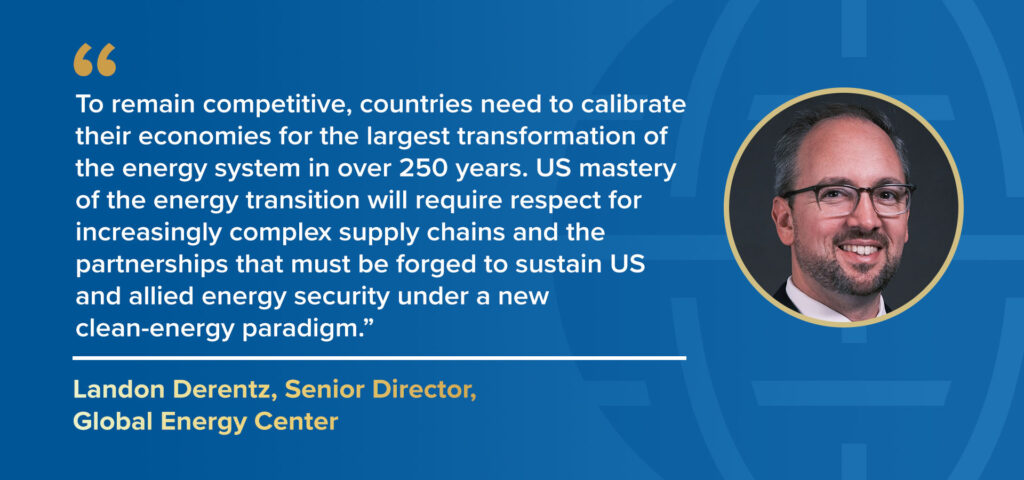
In 2023, the Global Energy Center continued to navigate the consequences of how the transforming energy system is impacting national security and the pathways to a net-zero future.
The Global Energy Center completed a scenario-based assessment of how the conclusion of the war in Ukraine could enhance Europe’s energy security. The center illustrated the comprehensive role nuclear energy can play in the energy system with its inaugural Nuclear Energy Policy Summit, held in New York during the United Nations General Assembly, and began to address core clean-energy supply-chain challenges and opportunities that will shape the net-zero future with direct implications for the competitiveness of the United States and its partners and allies.
This culminated at COP28 in Dubai, where the center’s Global Energy Forum and other sideline programming led an inclusive dialogue around the energy transition that charted a clearer path forward for industry to engage in global efforts to address climate change. The COP28 programming was the capstone of a year of strategic engagement with industry, governments, and civil society.
For sixty years, the Atlantic Council has convened global leaders to address the world’s most pressing challenges. As a central pillar of this legacy, the Millennium Leadership Program (MLP) aims to connect and empower next-generation international changemakers who will shape the twenty-first century. Currently, the MLP comprises of the Millennium Fellowship, the Executive Leadership Intensive, the Climate Leadership Program, and the Young Global Professionals Program. Through its programs, global professionals sharpen their leadership abilities, increase their capacity for meaningful impact, and build unique communities.
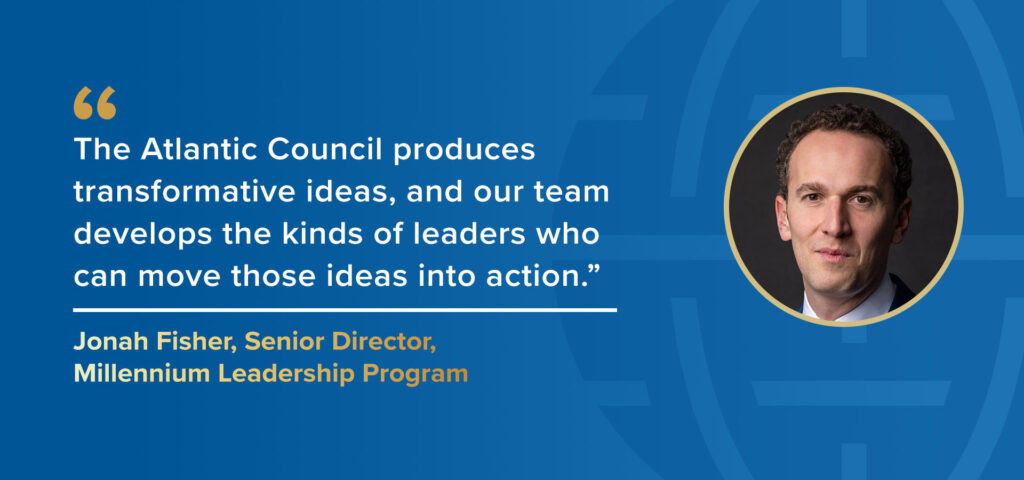
In 2023, the MLP team launched two new programs and brought eighty-three young global leaders to three continents. In March, the 2022 millennium fellows took a study tour to Guatemala; in July, the program convened next-generation climate investors in Ghana; and in November, a delegation of the 2023 millennium fellows visited Taiwan.
The inaugural class of the Climate Leadership Program brought together climate-finance leaders from the United States, the European Union, the African Union, and China to advance a more inclusive, impactful, and prosperous climate-finance ecosystem.
During the past year, the program expanded its partnership with the executive search firm, Spencer Stuart, which now provides the uniquely curated leadership training for the millennium fellows. Additionally, with more than two hundred alumni of the Millennium Fellowship, the inaugural Fellowship Alumni Board is working tirelessly to connect, train, and empower the program’s wider alumni network.
As the Middle East and North Africa (MENA) region continues to undergo significant political and socioeconomic changes, the Rafik Hariri Center and Middle East Programs are leading the way in providing a forum for informing and galvanizing the transatlantic community to shape a stable and prosperous region. The center has been at the vanguard of MENA current affairs, policies, and shifts for more than a decade. The center works in, with, and on the MENA region, amplifying regional voices and connecting regional stakeholders to their counterparts in the US and Europe. The mission is to promote peace and security and unlock the region’s economic and human potential through the ideas we publish, the solutions we generate, and the communities we influence.
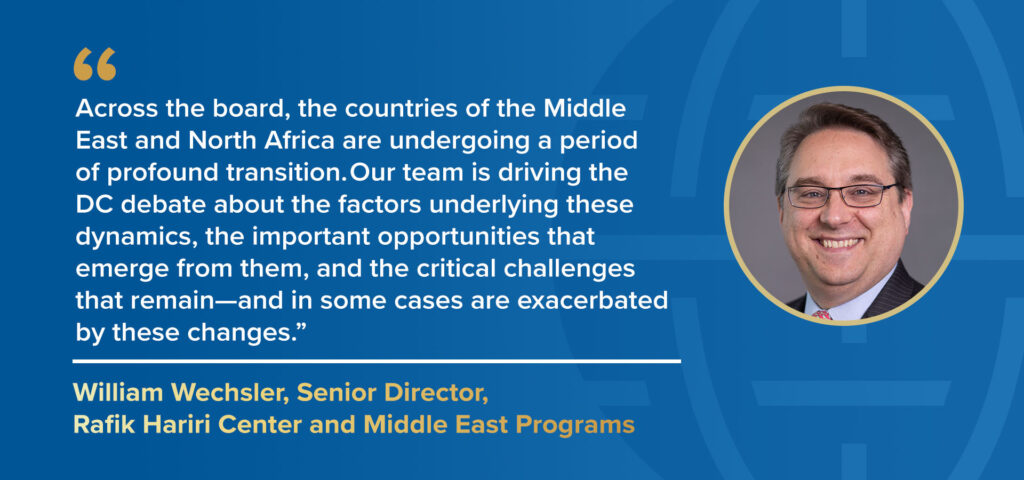
2023 was an eventful year for the Middle East and North Africa, beginning with devastating natural disasters affecting Syria, Morocco, and Libya; including widening economic and environmental challenges; and ending with the Israel-Hamas war.
The Middle East Programs began the year honoring five trailblazers who embody the ethos of its work at the first Rafik Hariri Awards and celebrating the tenth anniversary of the center with a gala at the John F. Kennedy Center in Washington. The center continued to prioritize unlocking the human potential of the region, as the WIn fellowship—an executive leadership program for women—concluded its inaugural cohort from Saudi Arabia with a week-long roadshow and a graduation ceremony. The fellowship then expanded to include women entrepreneurs from the United Arab Emirates (UAE) and Bahrain for its second iteration.
The year was momentous for the Middle East Programs as a convener of diverse regional and US voices and decision makers and a hub for thought leadership and policy engineering. Positioning itself at the forefront of regional crises and developments, the center hosted Egyptian Foreign Minister Sameh Shoukry, Israeli President Isaac Herzog, Iraqi Foreign Minister Fuad Hussein, and Iranian human rights advocates from the Woman, Life, Freedom movement. The center actively promoted regional integration and peace through a series of convenings led by the N7 initiative on agriculture, food, and water security in the UAE and on trade in Bahrain.
The Scowcroft Center for Strategy and Security works to develop sustainable, nonpartisan strategies to address the most important security challenges facing the United States and its allies and partners. The center honors the legacy of service of General Brent Scowcroft, including his ethos of nonpartisan commitment to the cause of security, support for US leadership in cooperation with allies and partners, and dedication to the mentorship of the next generation of leaders.
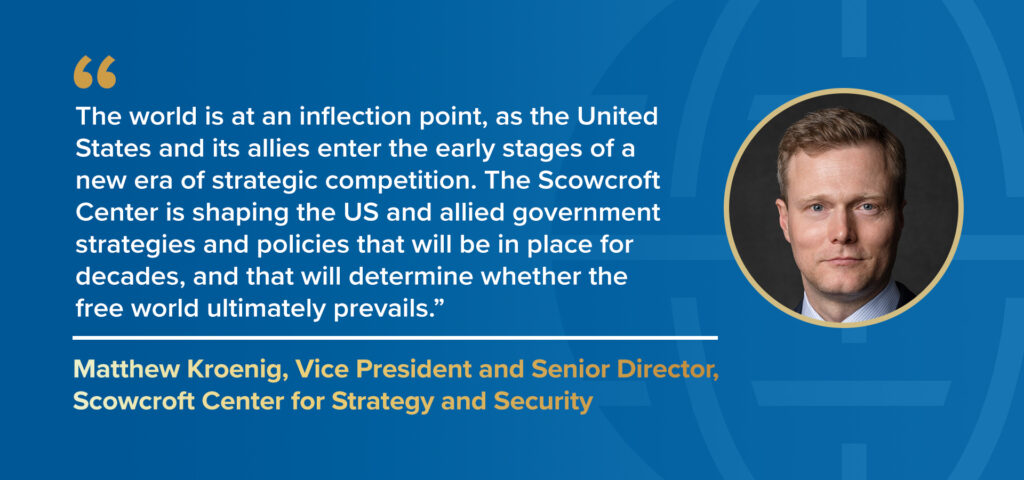
The world is at a historic inflection point, and the Scowcroft Center is working alongside the US and allied governments to shape the strategies and policies that will remain in place for the coming decades and determine whether the free world prevails over revisionist autocratic rivals.
Over the past year, the Scowcroft Center has executed its mission by leveraging its core competencies of strategy, alliances, and defense. The center’s strategy and foresight work continued to bear fruit, as it kicked off the year with its annual Global Foresight report, added new papers to its Atlantic Council Strategy Papers Series, and launched a new ACTV series, So What’s the Strategy?, which is the query the late General Brent Scowcroft would pose to colleagues while working as national security advisor. The center’s Commission on Defense Innovation Adoption, co-chaired by former US Secretary of Defense Mark T. Esper and former US Secretary of the Air Force Deborah Lee James, made ten recommendations, most of which were adopted, to improve the way the Pentagon buys new technology. For the fourth time, the center was an official partner at the NATO summit and influenced US and allied policy, as well as the public debate on major issues such as the war in Ukraine and NATO enlargement. Its Indo-Pacific security team worked to strengthen US alliances in the region, including publishing the Atlantic Council’s most-read long-form report in 2023 on the risks of a two-front war involving China and North Korea.
The South Asia Center (SAC) ) is the focal point for the Atlantic Council’s analysis of issues concerning the political, social, geographical, and cultural diversity of the region. At the intersection of South Asia and its geopolitics, SAC facilitates constructive dialogue to shape policy and forge ties between the region and the global community by producing cutting-edge analysis, convening key stakeholders, and amplifying policy conversations.
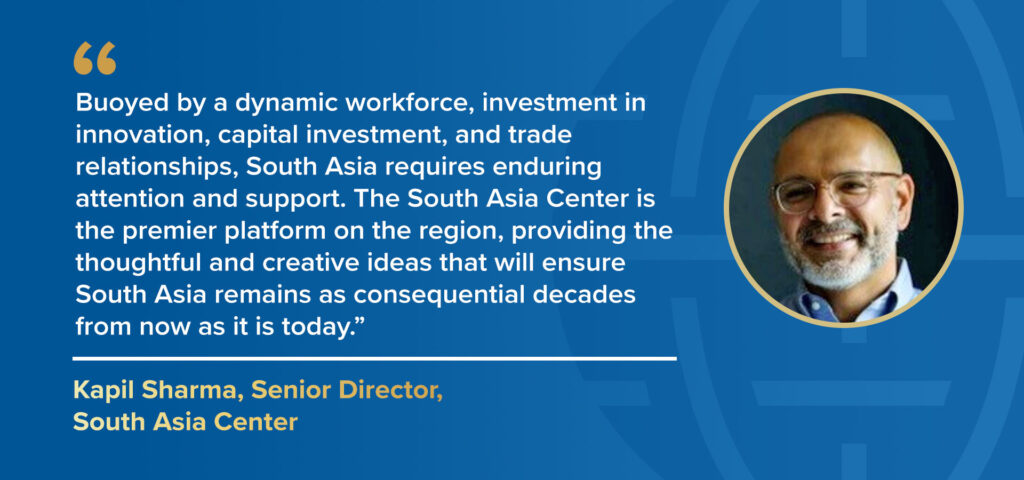
In 2023, SAC focused on the global emergence of the subcontinent.
With the continued rise of India on the global stage, SAC conducted events and projects related to the BRICS economic grouping, the G20, and the Joe Biden-Narendra Modi summits. SAC also conducted programming on the impact of small- and medium-scale enterprises, job creation, and defense, energy, and digital infrastructure in India and Pakistan. These events were supplemented with continued engagement with Indian and US government officials, as well as stakeholders in the United States and India.
SAC’s engagement on Pakistan broadened the conversation about the country’s political economy and economic future. SAC staff and nonresident fellows provided numerous contributions to the Atlantic Council’s New Atlanticist section and helped develop “Experts React” articles in response to regional events. The year concluded with the center’s widely cited annual Pakistan conference. However, the most viral highlight was an interview with former Prime Minister Imran Khan right before he faced political and legal challenges. This interview became the Atlantic Council’s second most-viewed video production ever.
In addition, SAC provided thought leadership on Bangladesh’s national elections and its political economy. On Afghanistan, SAC conducted a research project collating, documenting, and analyzing Taliban decrees related to women and girls.


